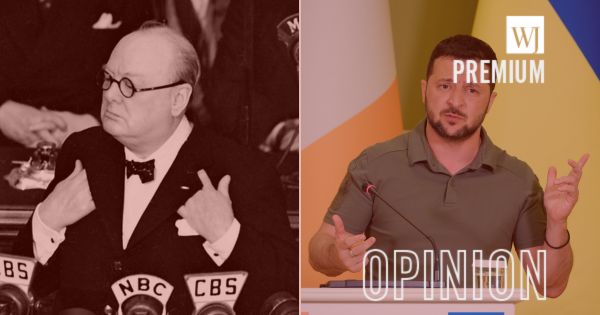
Don't Trust Ukraine: 'Ally' Using Same Propaganda Trick Britain Used to Ease US Into WWII - Part One
Since antiquity, countries have deployed and been victims of information operations launched against each other.
The objective of such operations has been to influence “the opinions, emotions, attitudes, and behavior” of target audiences to achieve strategic goals through the “planned use of propaganda and other psychological operations.”
When one thinks of information operations, however, one often focuses on those deployed by adversaries and enemies of the U.S.
Two countries have earned the reputation of being specialists in this field — Russia and China.
An examination of history and the present reveals that even countries America deems friendly have deployed — and continue to deploy — information operations against the American public.
As is the case with our enemies, these operations alter the public’s “opinions, emotions, attitudes and behavior” in favor of our allies’ own interests.
Is Ukraine Manipulating Us?
The question of information operations by allies and friendly countries is crucial today as the U.S. doles out large amounts of money and weaponry to Ukraine to help the country fight Russia.
With every passing day, Ukrainians and pro-Ukrainian lobbyists grow more pressing in their demands for advanced weaponry.
This risks escalation and greater U.S. involvement in what is a regional war. Such interventions come with the danger of turning an armed conflict between two neighbors into a nuclear hot war between two great powers.
Ukraine lobbyists and pro-Ukraine activists employ a vast array of tools to manipulate American audiences into letting go of inhibitions concerning direct intervention in, and escalation of, the conflict.
But before examining Ukrainian information operations at present, it is essential to understand the history of information operations launched by friendly countries against the American public.
U.S. Isolationism and World War II
There is no better example of such operations in American history than British propaganda in World War II aimed at peddling war to a reluctant American public.
Avoiding entanglements in Europe was a long-standing policy of the U.S. — since the time of George Washington.
This policy is best described in the words of former President Thomas Jefferson: “Peace, commerce and honest friendship with all nations; entangling alliances with none.”
Though the U.S. took part in World War I after the sinking of the Lusitania and the Zimmerman telegram, once the war ended, the country returned to focusing inwards. For example, despite the desires of Woodrow Wilson, the Senate managed to prevent the U.S. from becoming part of the League of Nations.
Isolationism — the belief that the war in Europe is a European conflict, where the U.S. is better off remaining on the sidelines — was prevalent.
After World War II began, neutrality advocates called for both building up the U.S.’s economy and military capabilities and avoiding taking a side in the conflict.
Isolationists stressed that the U.S.’s geographical endowments, with the Pacific and Atlantic serving as potent moats, protected the U.S. from what were European problems.
The British Need to Manipulate Allies
For the British, however, the prevalence of U.S. isolationism was bad news.
As Germany mowed through Poland and France, launching air raids into the British Isles, both Greece and Crete were lost.
The British soon realized that this was a war they could not win by themselves.
Only if Uncle Sam joined the fray would Britain be able to turn the ominous tide, though an early intervention was not in American interests.
Now, I must make clear that I am not necessarily saying American intervention in World War II after Pearl Harbor was wrong per se, but rather if the U.S. interfered and joined the war in Europe before Pearl Harbor just because terrible atrocities were happening, that would have been a premature move.
Premature moves risk weakening countries and leaving them worse off — regardless of any noble intentions.
The British Propaganda Campaign
To try and convince Americans to neglect their rational self-interests, the British engaged in an elaborate propaganda campaign.
Taking advantage of American distaste towards Nazism, as Justus Drew Doenecke noted in his review of Nicholas John Cull’s book “Selling War: The British Propaganda Campaign Against American ‘Neutrality’ in World War II,” Britain would tactically release accounts of life under Nazi occupation.
The goal here was to — as an officer working in British propaganda said, according to Doenecke — “make friends friendlier.”
Through relations with the American press, Doenecke noted, the British deliberately propagated photographs of bomb damage considered too horrendous and gruesome for domestic circulation.
The British also managed to trick U.S. President Franklin Delano Roosevelt with their use of disinformation.
According to reporting from the New York Post in 2019, Roosevelt tried to convince the American public to join the fray during an October 1941 talk at The Mayflower Hotel in Washington, D.C.
Roosevelt claimed he possessed a “secret map” made by the Nazi government on how to “reorganize” South and Central America and a document by the German government detailing how to get rid of world religions.
Although the crowd was enraged by what they thought were appalling revelations, both the “secret map” and plan to eradicate religions were false documents crafted by Canadian spy William Stephenson who operated out of the Rockefeller Center, the Post reported.
These are but a few examples of the many information operations carried out by the British to try and manipulate Americans into prematurely entering the war.
They bare striking similarities to those carried out by modern-day advocates of Ukraine.
Asking For Weapons, Hoping For Much More
As Cull noted, in February 1941 when then British Prime Minister Winston Churchill told Americans, “Give us the tools, and we will finish the job,” in an attempt at downplaying his desire for direct U.S. involvement, he was actually desiring more than “tools.”
Churchill’s statements for contemporary observers are eerily like those of Volodymyr Zelenskyy and other Ukrainian politicians.
As some critics of entanglement in Ukraine would point out, even though Ukrainian officials call for weapons to “finish the job” by themselves, they desire direct NATO involvement, so they won’t be fighting Russia alone.
British propaganda in its own time was similarly subtle.
This was to ensure attempts to egg the U.S. to intervene weren’t aggressive enough to provoke isolationist resistance.
To that end, the British employed tools commonly used by Ukrainian officials and diaspora lobby groups today to manipulate American foreign policy: atrocity propaganda, relationships with journalists and the use of misinformation and disinformation.
Stay tuned for the next installment of “Don’t Trust Ukraine,” which walks through the specific tactics used in Ukraine’s information war.
Truth and Accuracy
We are committed to truth and accuracy in all of our journalism. Read our editorial standards.
Advertise with The Western Journal and reach millions of highly engaged readers, while supporting our work. Advertise Today.












